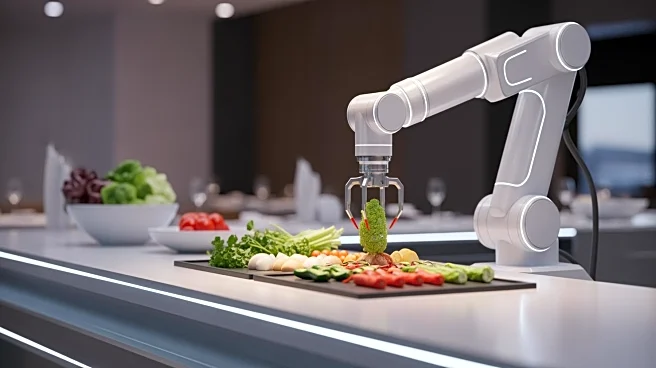What's Happening?
Appetronix, a robotic kitchen startup, has raised $6 million in a seed plus round led by Donatos Pizza founder Jim Grote, the Grote family, and AlleyCorp. This funding brings the company's total investment to $10 million. Appetronix aims to expand its
partnership with Donatos and other brands to deploy robotic kitchens in high-traffic locations such as airports, hospitals, and entertainment venues. The startup's technology includes automated pizza kitchens and concepts for Asian noodle bowls and Mexican burrito bowls, utilizing robotic arms and gravity-based dispensing systems. The company operates on a revenue-sharing model with partners, providing hardware and software as a service.
Why It's Important?
The investment in Appetronix highlights the growing interest in automation within the foodservice industry, driven by labor shortages and the need for efficiency. Robotic kitchens offer a solution to reduce labor costs and improve consistency in food preparation. By partnering with established brands like Donatos, Appetronix can leverage brand recognition to gain consumer trust and expand its market presence. The success of robotic kitchens could lead to significant changes in the quick service industry, potentially reducing reliance on human labor and altering traditional restaurant operations.
What's Next?
Appetronix plans to scale its manufacturing capabilities by outsourcing production to Asia, addressing the challenge of meeting demand for its robotic kitchens. As the company expands its installations, it will likely explore partnerships with additional brands and venues. The reception of robotic kitchens in various locations will be crucial in determining future growth and adoption. The company will continue to refine its technology and business model to enhance efficiency and reliability, potentially setting new standards for automation in foodservice.
Beyond the Headlines
The rise of robotic kitchens raises ethical considerations regarding job displacement in the foodservice industry. While automation can improve efficiency, it may also lead to reduced employment opportunities for traditional kitchen staff. Additionally, the integration of robotics in food preparation could influence consumer perceptions of food quality and authenticity, challenging companies to maintain high standards while embracing technological advancements.
















